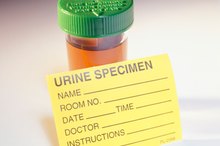Furosemide & Potassium
Furosemide is used to treat high blood pressure, liver disease and fluid retention. This medication affects the composition of the urine and can lead to changes in the levels of electrolytes, including potassium. If you are taking furosemide, your doctor may need to monitor your potassium levels or have you consume more potassium.
Uses of Furosemide
Furosemide works as a diuretic, which means that it causes the body to secrete more fluid into the urine. This can be used to treat certain conditions, such as congestive heart failure and liver failure. It is also helpful to treat certain types of kidney disease that can cause fluid to accumulate in the body, leading to swelling. Because the diuretic effect of furosemide also lowers the volume of the blood, patients can take it to treat high blood pressure.
- Furosemide works as a diuretic, which means that it causes the body to secrete more fluid into the urine.
- It is also helpful to treat certain types of kidney disease that can cause fluid to accumulate in the body, leading to swelling.
Mechanism and Potassium Loss
What Are the Benefits of Potassium Gluconate Supplements?
Learn More
Furosemide works by inhibiting the parts of the kidney that reabsorb the electrolytes sodium and chloride from the urine. By inhibiting this reabsorption, furosemide also causes less water to be reabsorbed, increasing the volume of the urine. These changes, however, can make it hard for the kidneys to reabsorb potassium, which causes more potassium to be lost in the urine. This can cause a condition called hypokalemia.
- Furosemide works by inhibiting the parts of the kidney that reabsorb the electrolytes sodium and chloride from the urine.
- By inhibiting this reabsorption, furosemide also causes less water to be reabsorbed, increasing the volume of the urine.
Symptoms of Hypokalemia
Potassium is needed to maintain the health of every cell in the body. Low potassium levels can affect your heart, leading to abnormal heart rhythms and skipped beats. Hypokalemia can also cause your muscles to spasm or feel weak, and can cause numbness and tingling because of its effects on nerves. In addition, low potassium causes constipation and fatigue.
- Potassium is needed to maintain the health of every cell in the body.
- Low potassium levels can affect your heart, leading to abnormal heart rhythms and skipped beats.
Treating Hypokalemia
Nutritional Problems If You Use Digoxin & Furosemide
Learn More
Your doctor may need to periodically check your potassium levels while you take furosemide. Taking potassium supplements or eating foods high in potassium can help you correct the condition. Some foods that you can eat to increase your potassium intake include sweet potatoes, tomato sauces, beet greens and beans. Talk to your doctor before making any significant changes to your diet or taking any sort of supplement.
- Your doctor may need to periodically check your potassium levels while you take furosemide.
Related Articles
References
- Patient.co.uk: Loop Diuretics
- MedlinePlus: Low Potassium levels
- Health.com: Foods That Are High in Potassium
- Potassium. Office of Dietary Supplements. National Institutes of Health
- Lambert H, Frassetto L, Moore JB, et al. The effect of supplementation with alkaline potassium salts on bone metabolism: a meta-analysis. Osteoporos Int. 2015;26(4):1311-8. doi:+10.1007/s00198-014-3006-9
- Chatterjee R, Slentz C, Davenport CA, et al. Effects of potassium supplements on glucose metabolism in African Americans with prediabetes: a pilot trial. Am J Clin Nutr. 2017;106(6):1431-1438. doi:10.3945/ajcn.117.161570
- Potassium. Fact Sheet for Consumers. Office of Dietary Supplements. National Institutes of Health
- Health Claim Notification for Potassium Containing Foods. US Food and Drug Administration
- Aburto NJ, Hanson S, Gutierrez H, Hooper L, Elliott P, Cappuccio FP. Effect of increased potassium intake on cardiovascular risk factors and disease: systematic review and meta-analyses. BMJ 2013;346:f1378.
- Academy of Nutrition and Dietetics. What Is Potassium?
- ConsumerLab.com. Potassium Supplements Review.
- Curhan GC, Willett WC, Rimm EB, Stampfer MJ. A prospective study of dietary calcium and other nutrients and the risk of symptomatic kidney stones. N Engl J Med 1993;328:833-8.
- Curhan GC, Willett WC, Speizer FE, Spiegelman D, Stampfer MJ. Comparison of dietary calcium with supplemental calcium and other nutrients as factors affecting the risk for kidney stones in women. Ann Intern Med 1997;126:497-504.
- D’Elia L, Barba G, Cappuccio FP, Strazzullo P. Potassium intake, stroke, and cardiovascular disease a meta-analysis of prospective studies. J Am Coll Cardiol 2011;57:1210-9.
- O’Neil C, Keast D, Fulgoni V, and Nicklas T. Food sources of energy and nutrients among adults in the US: NHANES 2003-2006. Nutrients. 2012;4:2097-120. DOI: 10.3390/nu4122097.
- Stone M, Martyn L, and Weaver C. Potassium intake, bioavailability, hypertension, and glucose control. Nutrients. 2016;8: E444. DOI: 10.3390/nu8070444.
- U.S. Food and Drug Administration. Health Claim Notification for Potassium Containing Foods.
- Weaver CM. Potassium and health. Adv Nutr 2013;4:368S-77S.
- Yong Sun, et al. Dietary potassium regulates vascular calcification and arterial stiffness. JCI Insight. 2017;2(19):e94920.
Writer Bio
Adam Cloe has been published in various scientific journals, including the "Journal of Biochemistry." He is currently a pathology resident at the University of Chicago. Cloe holds a Bachelor of Arts in biochemistry from Boston University, a M.D. from the University of Chicago and a Ph.D. in pathology from the University of Chicago.









